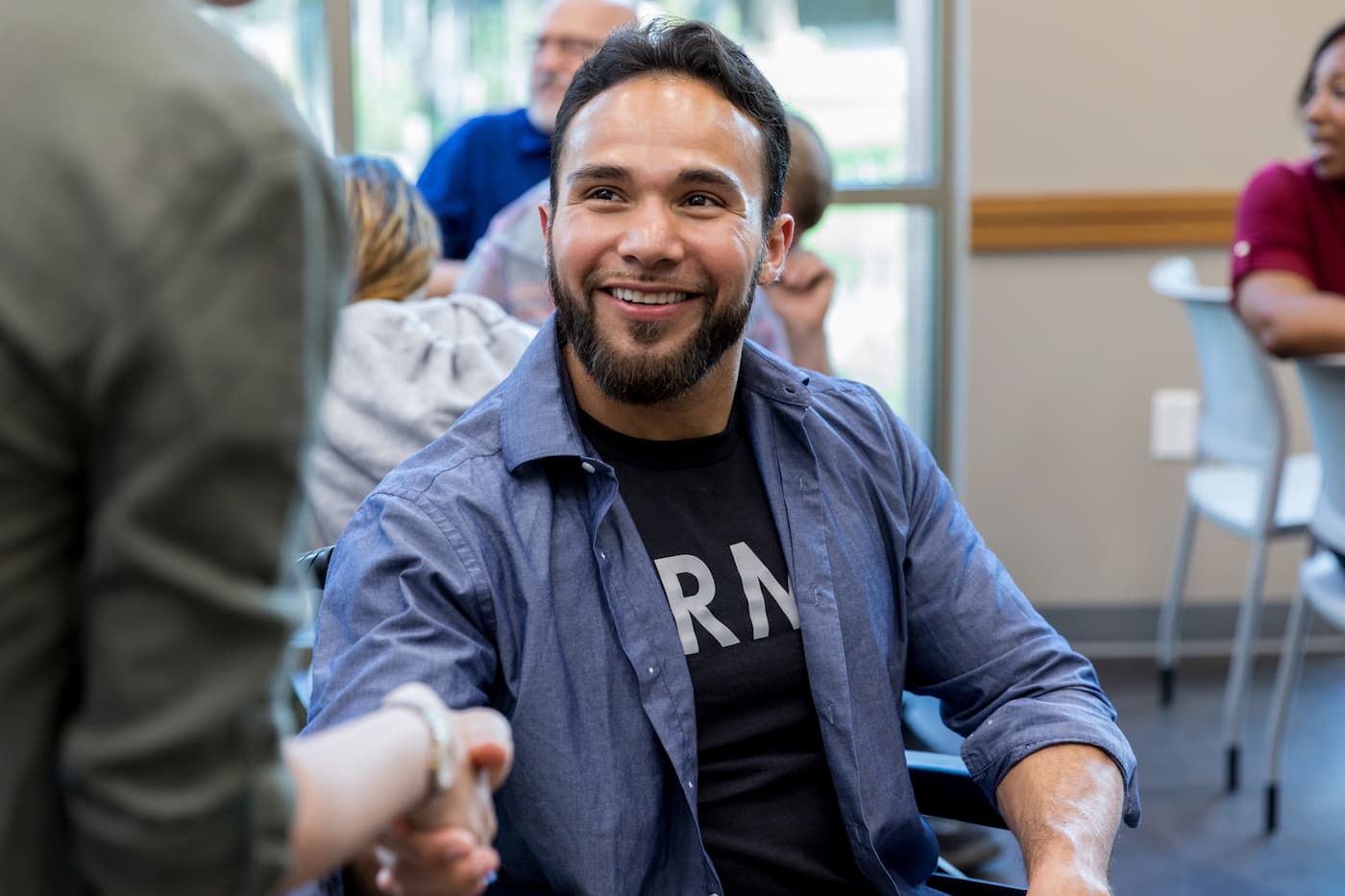The unique challenges of starting a veteran-owned business
Editorial Team
11 min read
Military veterans who are finishing their government contracts often have a lot of transferable skills that can help them successfully start a business.
In the military, service members learn skills such as:
- Leadership and delegation
- Time management
- Strategic thinking
- Communication
- Organization
- Teamwork
All of these qualities translate to the business world, but for any business owner, opening up and retaining a successful business can be a challenge. According to the U.S. Bureau of Labor Statistics, around one in five businesses will fail after the first year of opening. Around 50% will close within five years of opening.
If you’re a veteran who’s considering entering the entrepreneurial world, there’s lots of potential for you to make an impact. This guide explains some things to be aware of as a veteran business owner and how to navigate any challenges along the way.
The current landscape of veteran entrepreneurship
Veterans make up a significant portion of business owners in the U.S. In 2022, the U.S. Small Business Administration (SBA) reported veterans own nearly 2 million businesses, employ more than 5 million Americans, and generate more than $1.3 trillion in total annual sales.
Today’s veterans are becoming small business owners in a variety of industries, most prominently in:
- Professional services
- Construction
- Retail trade
- Healthcare
- Accommodations and food services
The SBA reports there’s also a significant number of veteran-owned businesses in areas including administrative support, real estate, wholesale trade, manufacturing, transportation, and finance. While some veterans choose to transfer the hard skills they learned in the military, such as welding or construction, to small business ownership, soft skills like project management, adaptability, problem solving, and emotional intelligence also translate to a wide variety of industries for aspiring veteran business owners.
Unique challenges faced by veteran business owners
While there are many paths to successful business access for veterans, pursuing a career as an entrepreneur can pose some unique challenges. The following are a few considerations for veteran business owners.
Transitioning from military to civilian life
Serving in the military is a whole other world from civilian life. That’s why the federal government presents resources for around 200,000 veterans going through a military transition each year.
Some of the challenges service members leaving the military might face include:
- Interpersonal
- Education
- Finances
- Housing
- Health
In the business world, service members may have a limited network and fewer industry connections. There may also be a lag in understanding the competitive landscape, which requires more research and analysis to determine a business need and where best to open up operations.
Another challenge veterans may have when they transition to the working world is adapting from military-speak to everyday “corporate speak”. This means eliminating military jargon from business speech, adopting less formal body language, and using more civilian-relatable language.
There’s also a need to understand how to translate skills learned in the military to the business environment. It may take some time for veterans to identify how to use what they’ve mastered in the military in a business setting.
Overcoming gaps in professional experience and connections
One of the major gaps in a veteran’s professional experience can include the missed opportunity for meaningful networking. Despite this challenge, there are quick and simple ways veterans can work on building a robust entrepreneurial network to help them open up and grow a business. These can include:
- Attending in-person and virtual industry networking events
- Creating a LinkedIn profile and joining relevant industry groups on the professional social networking site
- Connecting with your local SBA office, which provides training and counseling for aspiring entrepreneurs
You can also research industry trainings and webinars to attend. After you attend industry events, consider reaching out to the presenters or anyone you meet at an event on LinkedIn to add them as connections.
Access to capital and funding
A lack of credit history or a lower credit score can make it difficult to secure traditional small business loans and investments. For veterans, there are different resources available to help overcome this barrier, including:
- SBA Express Loan Program, which provides up to $500,000 in startup business loans for veterans and waives upfront guarantee fees for veterans, national guard members, reservists, and spouses who qualify
- Office of Veterans Business Development (OVBD), which connects veterans to SBA programs that provide access to veteran business loans
- Lender Match, which is an SBA program that connects aspiring business owners with lenders they qualify for
- Veteran Entrepreneur Investment Program (VEIP), which is a PenFed Foundation program exclusively supporting veterans and military spouse entrepreneurs
In addition to taking out veteran loans geared toward small businesses, there are also funding options such as:
- Seeking venture capital from investors
- Getting a business line of credit
- Bootstrapping: Using one’s own personal finances for funding
- Crowdfunding: Seeking funds from family members, friends, and community members to fund a business
The SBA presents resources on various funding options for entrepreneurs.
Veteran mental health and well-being
According to the National Library of Medicine, around one-third of veterans report chronic mental health conditions, including chronic pain, anxiety, depression, or sleep problems. These can impact veterans who want to open their own businesses.
It’s important for veterans who are transitioning from military life to civilian life to gain access to support networks and helpful mental health resources. The U.S. Department of Veterans Affairs (VA) has an entire department dedicated to connecting veterans with mental health resources.
Resources for veteran entrepreneurs starting a small business
Veterans have access to many resources that can assist them on their path to entrepreneurship. Below are some prominent ones to consider for veteran business owners.
Mentorship and coaching
Mentors are experienced business owners who can share their advice and insights with up-and-coming entrepreneurs. Mentees can talk with mentors to:
- Get answers to business-specific questions
- Learn tips for growing a business
- Learn about a mentor’s unique challenges and experiences in the business world
According to National Mentoring Day statistics, mentored entrepreneurs are twice as likely to have successful businesses past the 5-year mark compared to non-mentored entrepreneurs. Veterans can check out Veterati, a free military-specific mentoring network, and ACP, a nonprofit connecting veterans with mentors in the veteran community.
Leveraging military experience
Veterans have specialized experience that gives them an advantage in the business world. Veterans can think about how to adapt military strategies they’ve mastered and apply them in business contexts. For example:
- Leadership in military environments can lead to successful management in business
- Strategic planning in the military can translate to setting business goals and devising a business plan to achieve objectives
- Risk management skills in the military can help an entrepreneur identify and prepare for business obstacles
- Military supply chain and inventory management skills apply to business operations
Veterans have been able to hone their strengths and specific skills while in service. Delegation and teamwork are also instrumental skills in the military that can translate to a small business environment. Veterans who know their strengths can hire team members who complement them and fill in gaps.
Access to veteran resources
It’s helpful to be aware of government programs, disabled veteran business grants, VA small business grant programs, and veteran-focused incubators and accelerators that are geared toward veterans specifically, including:
- Programs and grants from the Disabled Veterans National Foundation, which may include tax benefits for veteran owned business
- Veteran Entrepreneur Portal from the VA
- Boots to Business (B2B) classes from the SBA
- Bunker Labs programs and courses for aspiring veteran business owners
- DAV Patriot Boot Camp for veteran entrepreneurs
- Entrepreneurship Bootcamp for Veterans (EBV) and D’Aniello Institute for Veterans and Military Families from Syracuse University
- Entrepreneurship Bootcamp for Veterans with Disabilities, from TEXVET
- GI Bill, which provides education and training financial aid for veterans
- National Veterans Entrepreneurship Program from the University of Tennessee Chattanooga, Oklahoma State University, and University of Florida
- Reboot classes for business fundamentals from the SBA
- The Rosie Network entrepreneur training
- Disabled veteran business start-up grants from the SBA
- Transition Assistance Program TAP training from the U.S. Department of Labor
- Veteran Entrepreneurial Training & Resource Network (VETRN)
- VetFran for veteran franchise opportunities
- Veteran Institute for Procurement
- Veteran Small Business Certification (VetCert) from the SBA
- VetNet free webinars for veterans from Syracuse University
- VETtoCEO business accelerator program from Warrior Rising
You can also connect with your local VA office or SBA office to find local veteran resources such as networking groups and events in your area.
Networking and community involvement
Veterans can meet like-minded business owners and entrepreneurs at in-person and online networking events, in webinars, and on LinkedIn. There are also veteran-specific groups for business owners and veterans employment specialists, including:
- Center of Excellence for Veteran Entrepreneurship
- Coalition for Veteran Owned Business (CVOB)
- MetaBoost’s Military and Veterans Hub
- National Veteran-Owned Business Association (NaVOBA)
- National Veteran Small Business Coalition (NVSBC)
- SCORE resources for veteran entrepreneurs
- Veterans and Military Business Owners Association, which features a veteran owned business list
- VetWorking, an industry group/forum for veterans on Facebook
- Women Veterans Interactive Foundation
You can use a membership in organizations such as the ones listed above to meet other veteran entrepreneurs, get advice for your business journey, and access veteran-specific resources to help you achieve your business ownership goals.
Success stories of veteran business owners
Millions of military veterans have gone on to grow successful new careers as entrepreneurs and business owners, including:
- Phil Knight and Bill Bowerman, co-founders of Nike: Bowerman and Knight both served in the Army before co-founding the famed shoe company. Bowerman returned to a college athletics coaching job post-military service, where he led and trained Olympic athletes. His leadership skills and passion for athletics were a perfect fit for starting his own shoe company. Knight, a track and field star who also had a passion for shoes, worked with Bowerman to create their own training shoe that eventually became Nike.
- Thereasa Black, CEO and founder of Bon Appésweet: Black, a Naval officer, created her plant-based chocolate and coffee company Bon Appésweet after transitioning out of the military. During her service, her young daughter developed a love for sweets, so Black crafted chocolate bar recipes that were naturally sweetened and healthier for both her daughter and the planet. In addition to selling delicious treats, the company promotes social justice causes, such as restoration of voting rights and funding of public defense.
- Margo Jordan, CEO and founder of Enrichly: Margo Jordan is an Army veteran who founded Enrichly, a service disabled veteran-owned small business and e-learning platform. The business started as a brick and mortar focused on teaching kids about self-esteem, and since the pandemic, has grown into an e-learning platform that now serves hundreds of thousands of kids throughout the country.
These are just a few examples of the different types of businesses veterans have successfully started, which have impacted millions of people throughout the world. Whatever veterans are passionate about, there’s space for former military members to make an impact.
The importance of supportive ecosystems for veteran entrepreneurs
Veteran entrepreneurs often have the skills they need to succeed in the business world, but just need the resources to guide them in the right direction. Department of Veteran Affairs federal, state, and local government policies and initiatives exist to help veterans transition to civilian life. They’re also empowering veterans to become entrepreneurs.
With the emergence of new veteran business owners associations, classes and business accelerators, and veteran-based support groups, there can be more opportunities for valuable business ideas and startups that serve local, national, and global populations.
While veteran entrepreneurs do face some challenges re-entering civilian life, they also offer unique skills that can strengthen business ecosystems. With the right support, veterans can become some of the world’s greatest business owners and inspire others to enter the business field as well.
Grow your business with the right tools
For veteran business owners and entrepreneurs in need of business management systems, Clover can help startups succeed with their user-friendly point of sale (POS) systems. Whether you need an employee management tool to schedule shifts, a retail POS system for in-store transactions, or a full restaurant POS system to streamline your establishment’s operations, Clover’s POS systems can help you do it all with one sleek, user-friendly tool.
Why wait? Elevate your business and get started with a Clover POS System today.
This information is provided for informational purposes only and should not be construed as legal, financial, or tax advice. Readers should contact their attorneys, financial advisors, or tax professionals to obtain advice with respect to any particular matter.
Related Posts
How Clover POS supports working mother entrepreneurs
What is a POS system, how does it work, and how do I choose one?
Popular Topics
Stay in touch
Sign up and learn more about Clover.
Thank you for your subscription!
More posts about starting a small business
eBook





